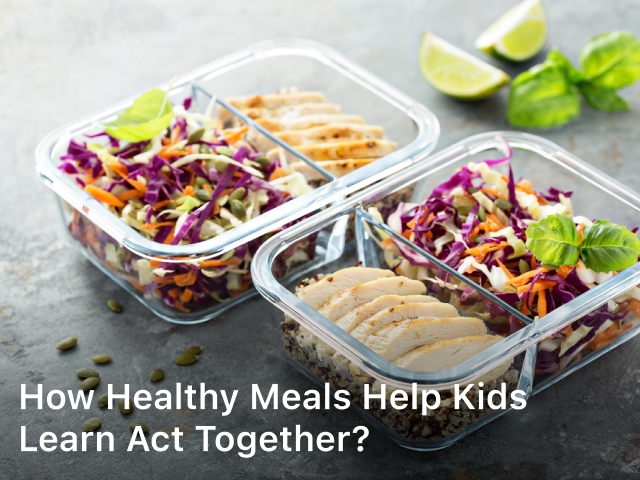How Healthy Meals Help Kids Learn Act Together?

fitguideguru.com. How Healthy Meals Help Kids Learn Act Together? Discover how healthy meals play a vital role in promoting children’s learning and cooperation skills. Learn how nutritious food positively impacts their cognitive development and overall well-being.
In the dynamic world of parenting, fostering a child’s learning and cooperation skills is a top priority. It’s no secret that a well-balanced diet is essential for a child’s growth, but did you know that the meals your child consumes can significantly impact their ability to learn and interact with others?
In this article, we’ll delve into the profound ways in which healthy meals contribute to children’s development and help them learn to act together.
How Healthy Meals Help Kids Learn Act
How Healthy Meals Fuel Cognitive Development
The link between nutrition and cognitive development is undeniable. Nutrient-rich foods, such as fruits, vegetables, whole grains, lean proteins, and healthy fats, provide the essential building blocks for brain development.
The brain’s growth and function are heavily reliant on nutrients like omega-3 fatty acids, vitamins, and minerals that are commonly found in these foods. By incorporating a variety of these ingredients into your child’s meals, you’re essentially giving their brain the fuel it needs to function optimally.
Nurturing Concentration and Focus
A well-nourished brain is better equipped to focus and concentrate. Foods rich in antioxidants, like blueberries and spinach, help protect brain cells from oxidative stress, enhancing cognitive function. Including these foods in your child’s diet can improve their attention span and concentration, which are crucial skills for effective learning.

Powering Memory and Information Retention
Memory plays a pivotal role in the learning process. Omega-3 fatty acids, commonly found in fatty fish, walnuts, and flaxseeds, have been shown to support memory and information retention. These healthy fats aid in the development of neural pathways, allowing children to absorb and retain new information more effectively.
Building Emotional Resilience
Emotional well-being is a cornerstone of successful learning and cooperation. Foods that stabilize blood sugar levels, such as whole grains and lean proteins, contribute to balanced moods and emotional resilience. When a child’s energy levels are steady, they are better equipped to manage their emotions and engage positively with others.
Enhancing Social Skills and Cooperation
Learning to act together involves developing strong social skills and the ability to collaborate with peers. Omega-3 fatty acids, present in fish and nuts, have been linked to improved communication and social interaction skills. These nutrients support the brain’s structure, aiding in the development of areas associated with social cognition.
Boosting Energy Levels
Proper nutrition directly influences a child’s energy levels throughout the day. Incorporating complex carbohydrates, such as whole grains and fruits, provides a steady release of energy. This sustained energy helps prevent energy crashes and mood swings, allowing children to remain engaged, active, and cooperative.
Strengthening the Gut-Brain Connection
The gut-brain connection is a fascinating link between our digestive system and brain health. Probiotic-rich foods, like yogurt and kefir, promote a healthy gut microbiome, which in turn positively affects brain function. A balanced gut microbiome has been associated with improved mood, reduced anxiety, and enhanced cognitive performance.
The Role of Hydration
Hydration is often overlooked but is crucial for optimal brain function. Dehydration can lead to fatigue, decreased cognitive abilities, and lack of focus. Encourage your child to drink water throughout the day to maintain their mental alertness and overall well-being.
Encouraging Healthy Eating Habits
Instilling healthy eating habits from a young age sets the stage for a lifetime of good choices. By involving your child in meal planning and preparation, you can foster a positive relationship with food. This involvement empowers children to make mindful food choices and appreciate the connection between nutrition and well-being.
FAQ’s
How do healthy meals impact a child’s behavior?
Healthy meals provide the nutrients necessary for brain function and emotional regulation. Nutrient-rich foods support stable moods and help children manage their behavior more effectively.
Can unhealthy eating habits affect a child’s ability to learn?
Yes, a diet high in processed foods and sugary snacks can lead to energy crashes, mood swings, and difficulty concentrating. These factors can negatively impact a child’s ability to learn.
Are there specific foods that enhance cooperation among children?
Foods rich in omega-3 fatty acids, such as fish and nuts, have been linked to improved communication and social interaction skills, fostering cooperation among children.
How can I encourage my child to eat healthy meals?
Make healthy meals enjoyable by involving your child in meal preparation, offering a variety of nutrient-rich foods, and being a positive role model for healthy eating.
Are there any quick and healthy meal ideas for busy parents?
Absolutely! Try whole-grain wraps with lean protein and plenty of veggies, or prepare a batch of overnight oats with fruits and nuts for a nutritious breakfast option.
Can hydration really impact a child’s learning abilities?
Yes, staying hydrated is essential for cognitive function. Dehydration can lead to decreased alertness and difficulty concentrating, affecting a child’s learning abilities.
Conclusion
As parents, we hold the key to providing our children with the best possible start in life. By understanding the profound impact of healthy meals on children’s cognitive development, emotional well-being, and social skills, we can actively contribute to their learning journey.
Nutrient-rich foods not only fuel their bodies but also nurture their minds, helping them learn to act together in harmony with their peers and surroundings.





